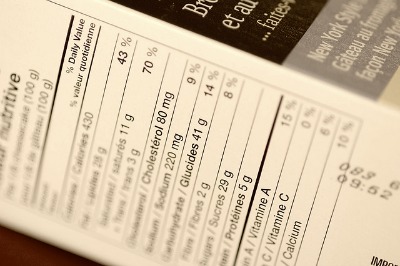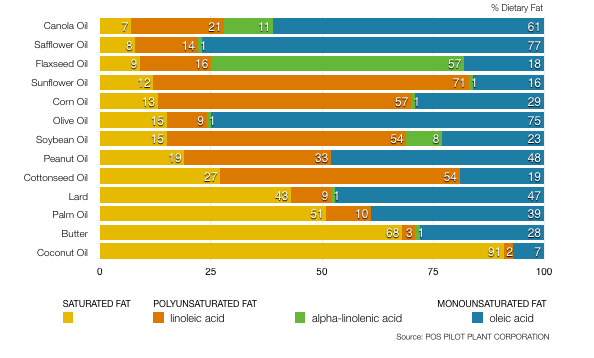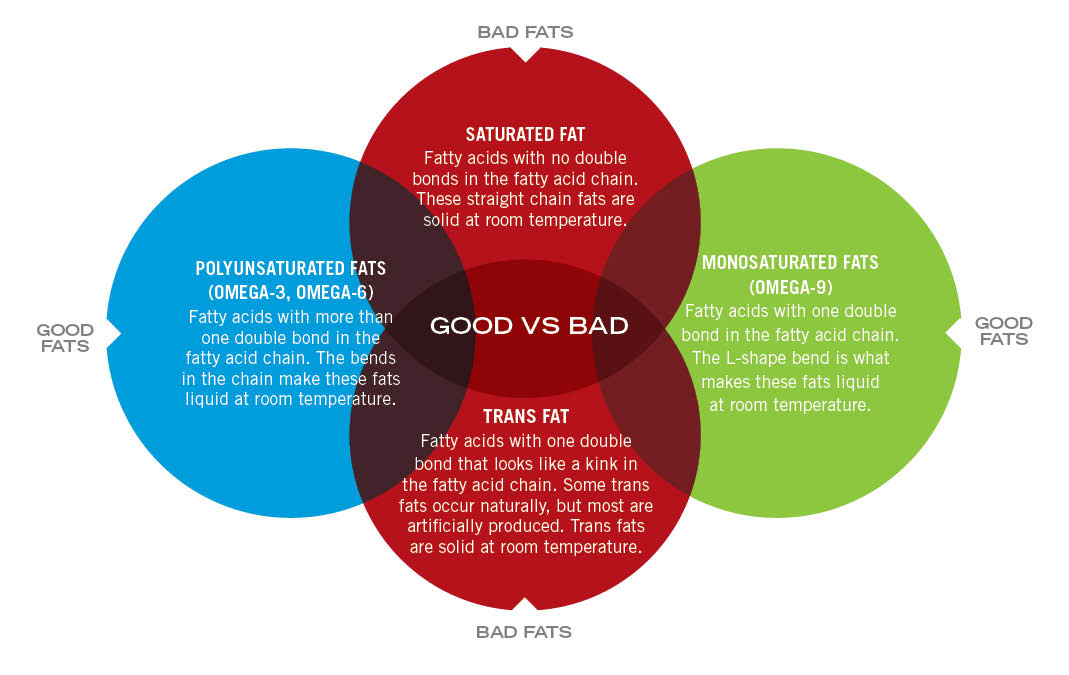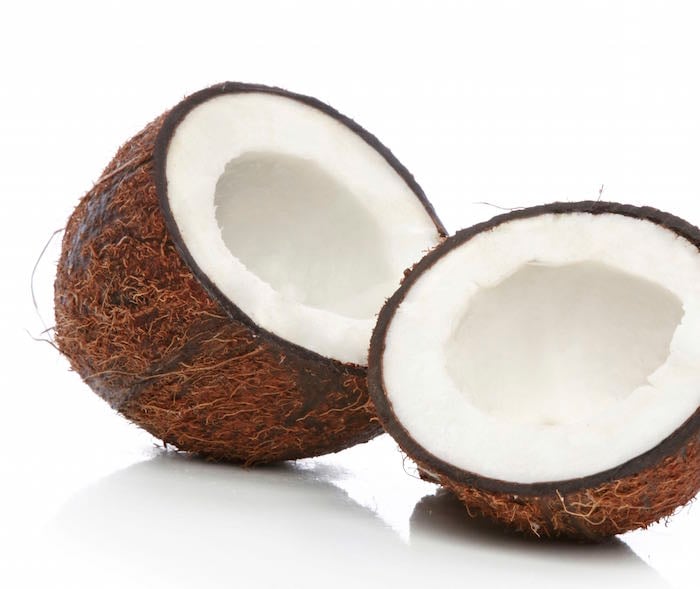Did you know that your oil is made up of a few different types of fats — some of which are regarded as healthy and some of which are not?
 There are 3 natural types of fat: Saturated Fat, Monounsaturated Fat and Polyunsaturated Fat.
There are 3 natural types of fat: Saturated Fat, Monounsaturated Fat and Polyunsaturated Fat.
Saturated fat is listed on the nutritional label of your products as a subcategory. Though they’re not often mentioned, there are 2 more subtypes that could be listed in the same area: the monounsaturated and polyunsaturated fats.
These last two are what is considered “good fat”. On the flip side, saturated fat is generally considered to be the “bad fat”. However, with the popularity of coconut oil, this has come under hot debate recently.
Trans fat seems to be in it’s own category, a widely known bad type of fat that is artificially created through partial-hydrogenation.
By looking at the different types of fat and the ratios of each within an oil, you can determine which ones are healthier and which ones you should limit.
Good vs. Bad Fat
This differentiation of “good fats” vs. “bad fats” is how dietitians can make the recommendation that olive oil (high in monounsaturated fat) is healthier than cottonseed oil (higher in saturated fat), for example.
Each type of oil is made up of molecules of each of these different types of fat, so will have unique ratios of these three types of fat put together.

Before we go any further, let’s review.
- Monounsaturated Fat (Healthiest)
- Polyunsaturated Fat (Healthier)
- Saturated Fat (Keep To A Minimum)
- Trans Fat (Unhealthy)
The Good Fats: Monounsaturated and Polyunsaturated Fats
Monounsaturated fats (also known as omega-9s) are fatty acids with one double bond in the fatty acid chain. This creates an L shaped bend in the molecule, which is what makes these fats liquid at room temperature.
Polyunsaturated fats (also known as omega-3s and omega-6s) are fatty acids with more than one double bond in the fatty acid chain. This bends the chain, making these fats also liquid at room temperature.
Monounsaturated and polyunsaturated fats are healthy types of fat that have numerous health benefits, including:
- Prevent coronary heart disease
- Prevent stroke
- Prevent diabetes
- Promote healthy nerve activity
- Improve vitamin absorption
- Maintain a healthy immune system
- Promote cell development
Monounsaturated fat is typically considered to be slightly healthier than polyunsaturated.
Oils like olive oil, canola oil and sunflower oil are made up of different percentages of primarily mono- and poly-unsaturated fats. This is why these oils are considered some of the healthiest options available today. 
Saturated Fats & The Coconut Oil Debate
On the other hand, saturated fats are considered to be unhealthier than their mono- and poly-unsaturated counterparts.
Saturated fats are fatty acids that have no double bonds. This creates a straight fatty acid chain which is solid at room temperature. With today’s interest in organic coconut oil, saturated fat is a highly debated topic. The advice still recommended by most nutritionists is that saturated fats should be limited.

In fact, with the popularity of Coconut Oil and the debate around if saturated fats are okay for you, the American Heart Association recently released a statement saying that they still believe that saturated fats are not good for you and should be limited:
"Cardiovascular disease (CVD) is the leading global cause of death, accounting for 17.3 million deaths per year. Preventive treatment that reduces CVD by even a small percentage can substantially reduce, nationally and globally, the number of people who develop CVD and the costs of caring for them.
This American Heart Association presidential advisory on dietary fats and CVD reviews and discusses the scientific evidence, including the most recent studies, on the effects of dietary saturated fat intake and its replacement by other types of fats and carbohydrates on CVD.
In summary, randomized controlled trials that lowered intake of dietary saturated fat and replaced it with polyunsaturated vegetable oil reduced CVD by ≈30%, similar to the reduction achieved by statin treatment.
Prospective observational studies in many populations showed that lower intake of saturated fat coupled with higher intake of polyunsaturated and monounsaturated fat is associated with lower rates of CVD and of other major causes of death and all-cause mortality. In contrast, replacement of saturated fat with mostly refined carbohydrates and sugars is not associated with lower rates of CVD and did not reduce CVD in clinical trials. Replacement of saturated with unsaturated fats lowers low-density lipoprotein cholesterol, a cause of atherosclerosis, linking biological evidence with incidence of CVD in populations and in clinical trials.
Taking into consideration the totality of the scientific evidence, satisfying rigorous criteria for causality, we conclude strongly that lowering intake of saturated fat and replacing it with unsaturated fats, especially polyunsaturated fats, will lower the incidence of CVD.
This recommended shift from saturated to unsaturated fats should occur simultaneously in an overall healthful dietary pattern such as DASH (Dietary Approaches to Stop Hypertension) or the Mediterranean diet as emphasized by the 2013 American Heart Association/American College of Cardiology lifestyle guidelines and the 2015 to 2020 Dietary Guidelines for Americans." Source
"The Dietary Fats and Cardiovascular Disease advisory reviewed existing data on saturated fat, showing coconut oil increased LDL ("bad") cholesterol in seven out of seven controlled trials." Source
However, there is still science to back the claim that saturated fat is okay: tests show that thesaturated fat that you eat doesn't simply absorb to become fat. In fact, their opposing results find that it's much more complicated than that.
If you're interested in learning more about coconut oil and the debate on oils, I'd recommend reading Know Your Fats: The Complete Primer for Understanding the Nutrition of Fats, Oils and Cholesterol.
Trans Fats
Trans fats are in their own category, because they don’t occur naturally in oils in high numbers.When you do see them, it’s typically because the oil has been partially-hydrogenated, a process by which a liquid oil like soybean oil is made solid by changing the bond structure. Trans fats are a fatty acid with one double bond that creates a kink in the fatty acid chain.
Trans fats are predominantly found in processed foods that contain partially hydrogenated oils (PHOs), and are widely considered to be unhealthy. They should be avoided as much as possible.
In fact, the FDA recently released a statement requiring that all food manufacturers swap out any PHOs they may be using to other healthier options within the next 3 years.
Good vs. Bad Fats: An Infographic

Topics: Comparing Oils












